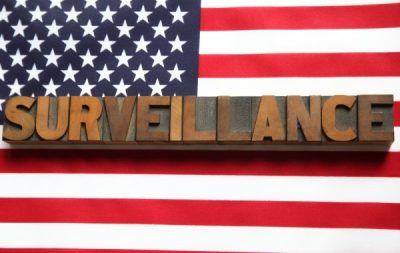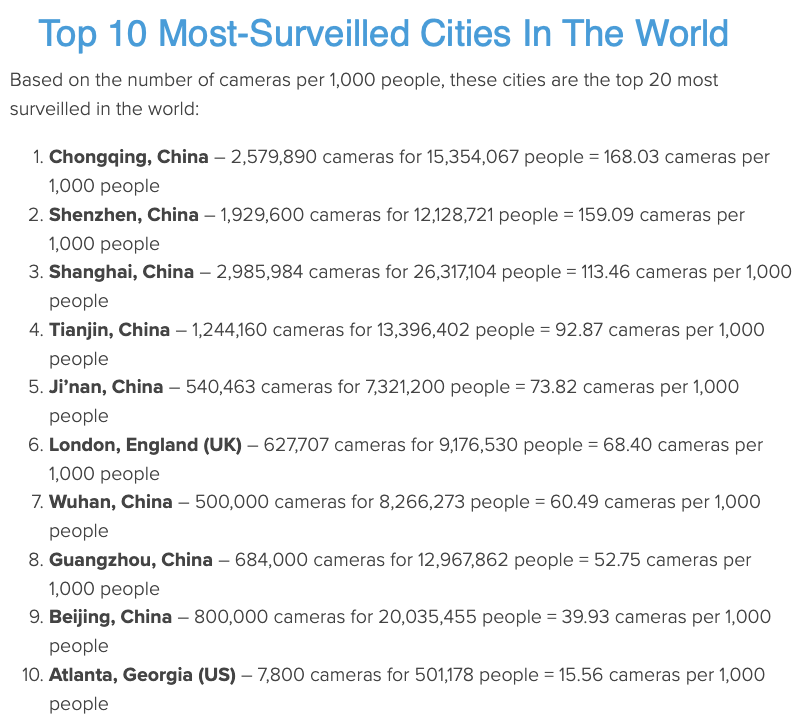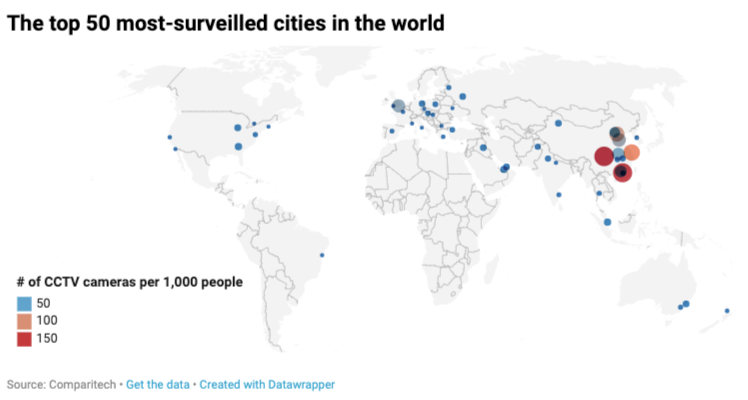Orwellian Nightmare: Six US Cities Make List of Most Surveilled Places in the World

A new report from Comparitech, a technology research firm, details how an Orwellian society, very similar to what was written in George Orwell’s (non-fiction) novel 1984, is playing out across cities in the US. According to Comparitech, six US cities made the top 50 list of the most surveilled places in the world.
Why? Because closed-circuit television (CCTV) cameras in the US have increased from 33 million in 2012 to nearly 62 million in 2016 and could double or triple from there in the next five years. Both government and private sources operate these cameras in cities.
Surprisingly, CNN HQ-host Atlanta was the US city to make the top ten list, with 15.56 cameras per thousand residents. Cities in China dominated the top 10 ten, with 8/10 spots. Cities in China averaged 39.93 to 168.03 cameras per thousand residents. London, England, was No. 6 on the list with 68.40 cameras per thousand residents.

The five other US cities on the top 50 most surveilled places in the world were all Democratic party bastions, including Chicago No. 13 with 13.06 cameras per thousand residents; Washington, DC, No. 28 with 5.61 cameras per thousand residents; San Francisco No. 38 with 3.07 cameras per thousand residents; San Diego No. 42 with 2.48 cameras per thousand residents, and Boston No. 46 with 2.23 cameras per thousand residents.
Kenneth Johnson, former Chicago Police Department commander of the Englewood district, told the New York Times last year that residents shouldn’t be worried about their privacy because the cameras are in public places. “This isn’t a secret. This isn’t an Orwellian ‘Big Brother.'”
Atlanta Sgt. John Chafee told Route Fifty that surveillance cameras “play a vital role” in keeping the public safe and the city is expected to expand its more than 7,800 cameras in the next several years.
“Access to these cameras multiplies the number of eyes we have on the street looking for criminal activity and assisting with situational awareness during large events and gatherings,” Chafee said. “They allow us to identify criminal activity as it is occurring, prevent and deter criminal activity, and capture video evidence when a crime does occur to aid in criminal investigations and prosecutions.”
Privacy rights groups, including the Anti Surveillance Coalition (ASC), have called for San Diego to stop surveilling its citizens through cameras.
“I understand that there may be benefits to crime prevention, but the point is, we have rights and until we talk about privacy rights and our concerns, then we can’t have the rest of the conversation,” Genevieve Jones-Wright of the ASC told NBC San Diego.
And last week, we reported that Edward Snowden laid it all out for both The Guardian and Spiegel Online, in a Moscow interview to promote his new 432-page book, Permanent Record, which will be published worldwide on Tuesday, September 17.
The infamous whistleblower said: “The greatest danger still lies ahead, with the refinement of artificial intelligence capabilities, such as facial and pattern recognition.” Adding that, “An AI-equipped surveillance camera would be not a mere recording device, but could be made into something closer to an automated police officer.”
With more and more US cities entering the Minority Report dystopia, there is no turning back for cities like Atlanta, Washington, DC, San Francisco, San Diego, and Boston after the implementation of mass surveillance cameras. Artificial intelligence will be the next layer added to these cameras in the early 2020s, acting as automated police officers, as individual rights and privacy are inexorably stripped away in the US government’s quest for supreme control over everything.
*
Note to readers: please click the share buttons above or below. Forward this article to your email lists. Crosspost on your blog site, internet forums. etc.


